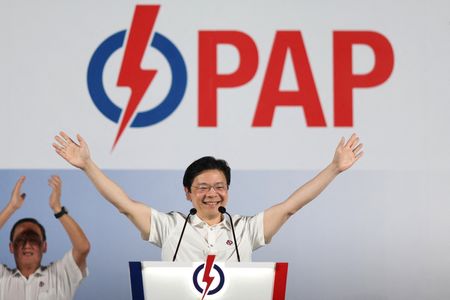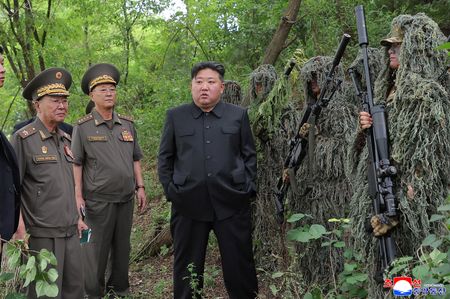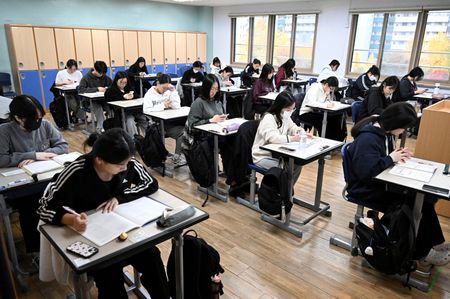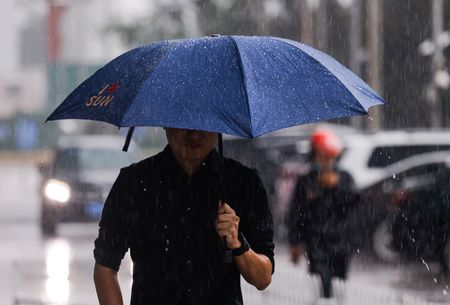By Xinghui Kok and Jun Yuan Yong
SINGAPORE (Reuters) – Singapore’s dominant People’s Action Party is widely expected to sweep eight or nine out of every 10 seats in the May 3 general election as it typically does, making it one of the world’s longest-reigning ruling parties in a democracy.
The PAP has run Singapore since 1959, before independence, overseeing a transformation of the city-state into a financial hub of six million people with foreign investment, good governance and public services that have made it the envy of its Southeast Asian neighbours.
The PAP’s longevity relies on continuity and stability, with voters consistently sticking with the party they know and ignoring under-funded opposition parties that remain an unknown quantity to many.
“Opposition parties claimed that the playing field is somewhat uneven because they typically face a resource gap, less media exposure, and do not have strong grassroots support,” said former PAP lawmaker Zainal Sapari.
“The main handicap is the voters’ psychology as many are still cautious about voting for the opposition because they associate the PAP with security and success. It takes time to shift those perceptions.”
The expectation that the PAP will retain power, despite a growing unhappiness with its governance, contrasts with how incumbents in many democracies have fallen out of favour since the COVID pandemic, which was followed by a sharp jump in inflation and the cost of living.
Japan’s Liberal Democratic Party’s coalition lost its majority for the first time in more than a decade in an election last year. It is now ruling in a minority government. Only Paraguay’s Colorado Party, in power since 1947, has ruled a democracy longer than the PAP.
A factor in the PAP’s ability to maintain its unbroken rule, analysts say, is a responsiveness to concerns over immigration, transport, housing prices and supply bubbles, while maintaining giveaways during hard times to keep discontent at bay.
In 2011, the PAP had its worst election performance on record as it faced anger over housing prices, immigration and crowded trains. It won 60.1% of the popular vote – a landslide win in any democracy but was seen by the PAP as a wake-up call. Then Prime Minister Lee Hsien Loong apologised and reined in home prices and immigration, and built more train lines.
Housing and the cost of living in Singapore, among the world’s most expensive cities, are again election issues as the economic outlook deteriorates due to U.S. tariffs, with the government warning of a possible recession.
MEDIA, POLITICAL SYSTEM
Others argue the PAP’s dominance relies on the political system being to its advantage, with more than half of electoral wards being multi-member constituencies of up to five seats, for which opposition parties struggle to recruit candidates. Steep candidate deposits of S$13,500 ($10,280) are also an obstacle.
Political scientist Chong Ja Ian said the PAP has a close relationship with state institutions and recruits candidates from those bodies, which opposition parties have difficulty doing.
“It also has robust management of the press. Critics argue that the PAP’s dominance enables it to shape laws and electoral rules, including electoral boundaries, to its advantage,” he said.
Though a PAP defeat is highly unlikely, seat gains for the opposition in this election have the potential to alter the dynamic of Singapore politics in the years ahead, according to some analysts, and create a path towards greater plurality.
Opposition progress in recent elections, albeit small, has been widely interpreted as signs of disenchantment with the PAP monopoly and a hankering among some Singaporeans, particularly younger voters, for more diverse politics, alternative voices and more robust debate.
“If things don’t change and cost of living and housing issues don’t get solved by the end of the term, in five years, I think people will lose confidence and may seek alternatives,” former PAP lawmaker Inderjit Singh said.
(This story has been corrected to say that Japan’s Liberal Democratic Party lost its majority in last year’s election and is now ruling in a minority government, in paragraph 7)
(Reporting by Xinghui Kok and Jun Yuan Yong; Editing by Martin Petty and Michael Perry)









